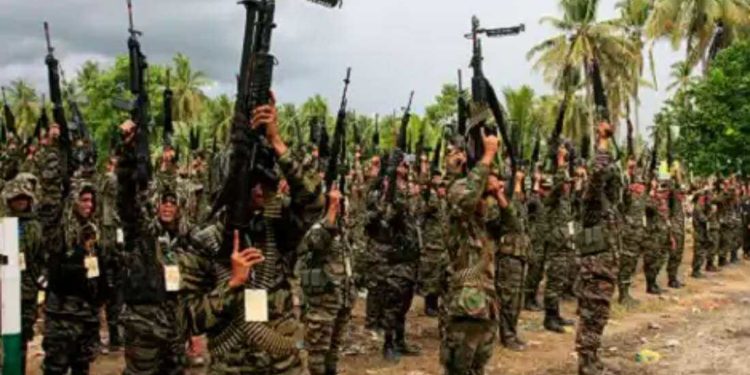Bangsamoro Islamic Freedom Fighters were exhausted due to continued military operations in the Maguindanao region
Members of the Islamic extremist outfit Moro Islamic Liberation Front (MILF) in Mindanao are seen in this file photo (Photo: Mark Navales)
Six members of the Muslim extremist group Bangsamoro Islamic Freedom Fighters (BIFF) surrendered their weapons to the military forces at Maguindanao province in Mindanao, a restive, conflict-scarred region in the southern Philippines.
The fighters of the state-declared terrorist group laid down their arms to the military’s Western Mindanao Command on Jan. 15, said a top military commander.
“As a sign that they had indeed abandoned the cause they were fighting for, the BIFF members also gave their one 60mm mortar, one M16A1 rifle, one Garand rifle, one Carbine rifle, one long magazine, one rocket-propelled grenade launcher with one ammunition and one improvised explosive device,” Brigadier General Arturo Rojas told reporters.


The Philippine army has reported that the extremist group was exhausted due to the continued military operations in the Maguindanao region.
“We have been conducting raids and house arrests for suspect members of the extremist groups based on intelligence reports. Of course, we do it legally under a search warrant or a warrant of arrest… members of the group got tired, so they surrendered instead of hiding for their safety,” Rojas added.
The Armed Forces of the Philippines said although President Ferdinand Marcos, Jr. has ordered an offensive attack against the rebels, humanitarian protocols were in place for those who surrendered.
“We welcome the former violent extremists and extend our assistance to them as they return to mainstream society. Rest assured that we will keep them safe as they prepare themselves to become productive members of their respective communities,” Lieutenant General Vicente Bacarro, the army’s chief of staff, told reporters on Jan. 16.
Bacarro praised local communities for helping them track down trails of suspected terrorists particularly in navigating the forests of the Mindanao region.
“We, the Armed Forces, share all our gains and successes with our partners and stakeholders, the local government units, and the populace. Let us continue to strengthen our collaborative efforts to end terrorism and sustain stability here in Mindanao,” Bacarro added.
Caritas Philippines had worked with government officials for the surrender of the Muslim extremists, especially for their rehabilitation.
“We provided them with rice and financial aid. Mostly, people join these (extremist) groups because of poverty. So, we need to address it first. Then we will provide them with livelihood,” Mindanao Caritas Chairperson Father Roel De Guzman told UCA News.
The priest said they were in the process of profiling each member so they could reach out to their local community and families.
“They lacked communication with their loved ones because they are afraid that government forces would torture their family members to extract information about their whereabouts. But if they see that church and government make the first efforts to bring them to their family members, then somehow there is hope they’d trust the process again,” Father De Guzman added.
The army’s data revealed 4 out of the 6 rebels were coconut farmers in the Visayas region. They had pending warrants of arrest for the alleged bombing of a bus in January last year.
A child had been killed while six others were wounded after a bomb exploded on a passenger bus in Cotabato City in Mindanao.
“They had pending warrants. But they will be given lawyers to make sure justice will be served and their rights will be protected,” Mindanao lawyer Chris Logibao told UCA News.
For their security, the Philippine army has opted not to divulge the identities of the members of the BIFF group. The extremist group did not issue a statement since the surrender.
For decades, the Mindanao region has been known as a conflict zone due to the fighting between Islamic extremists and the military that claimed thousands of lives. The main extremist outfit, the Moro Islamic Liberation Front (MILF) has long battled for greater autonomy for the region.
The outfit disarmed thousands of its fighters after the Philippine government passed the Bangsamoro Basic Law in 2018 to offer greater autonomy for Muslims in Mindanao. However, many of its fighters have reportedly joined other extremist outfits including Aby Sayyaf which is still active in the region.
Analysts blame widespread poverty in the region with a population of 24 million for breeding extremism. Mindanao is known as the breadbasket of the Philippines thanks to its promising agriculture sector and natural resources.
Yet, the region has the highest poverty rate in the country. In 2021, Mindanao had 26.1 percent of people in extreme poverty, according to the Philippine Information Agency.
Latest News
Credit: Source link




